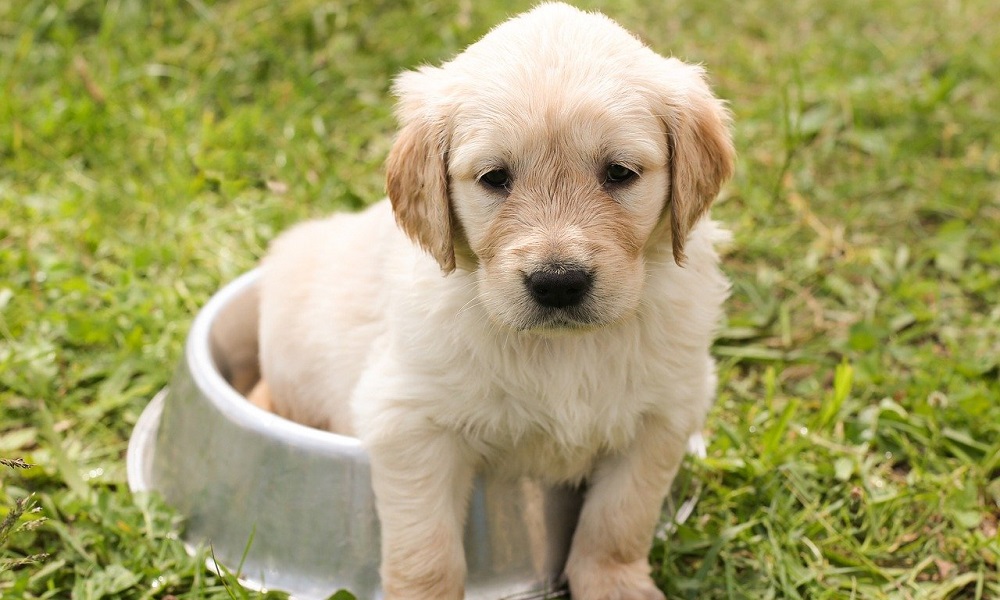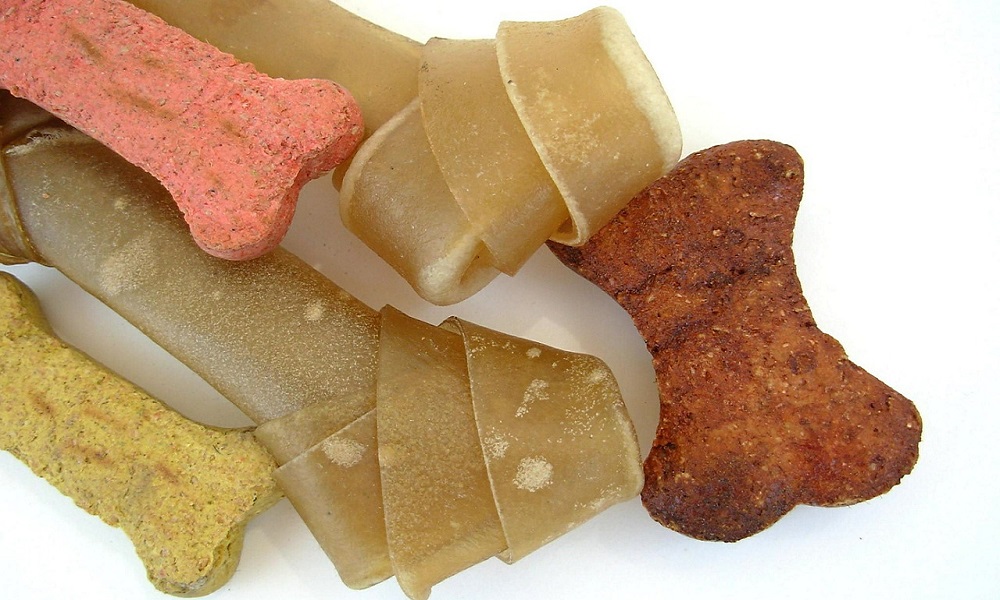Pet parents often find themselves wondering about the type of food that is best suited for their dog. The most common questions about pet nutrition are whether your pooch should have grain-free food or not and whether adult dog food is safe for your pup.
If you own a little furry friend, you need to know that while all types of dog foods are intended for canines, these do differ in their nutritional specifications. In short, it is highly recommended to give puppies the respective puppy food. Similarly, adult dogs should be given adult food.
The reason for this is simple, growing canines and older dogs have different nutritional requirements according to their age and activity. To maintain your pooch’s health, it is important to keep his age in mind. However, when your pet reaches adult age, you can change his diet to a more appropriate one.
In this guide, we will talk about why a pet’s age should be considered when buying pet food and when is the right time to give your pet adult food.
Which Foods do Puppies Like to Eat?
Young puppies are quite often open to many new things in both food choices and pet accessories. However, while your pup may go after anything that seems yummy, it may not always be the best for his health. Therefore the question arises to seek the pet food that is loved by most puppies.
Here, you need to take the flavor, nutritional balance, and quantity into account. Pets in the growing age also require extra nutrients. Therefore you need to make sure his food is nutritious and fulfills his daily nutrient requirement. Following are a few qualities that puppies love in their food:
- Protein-Rich Energy Filled Pet food: Pups are often more energetic and need food that provides them with quick energy. Protein-rich foods provide exactly that. These foods contain larger amounts of arginine, leucine, phenylalanine, histidine, isoleucine, and more. Puppies also love tasty foods – kibble and treats are often the foods that fall in this category.
- A Meal Served With Love: Another important thing for a pup’s meal is love. That’s right, puppies enjoy and need love. This can be in the form of feeding your pet by hand or spending a lot of time with your pooch. In short, getting lots of attention and treats is probably something all puppies love.
- Food that is Easy on the Stomach: Last but not least, they need foods that are easy to digest. Young pets may have a weaker immune system as compared to older dogs. Therefore the pet food should be free from grains or any ingredients that are difficult to digest.
Keeping all these points in mind, most puppies love to eat tasty and light foods given to them with love. However, the choice of the ingredients still remains to be made. It is also important to take care of your pet’s nutrition intake because that impacts his health and growth.
Puppy Food vs. Adult Dog Food
When you are looking for the ideal food the give to your newest furry friend, wholesome dog food is the best choice. It is not recommended to give human food to your canine as a puppy’s requirements are different from ours. However, which pet food is ideal for your pet also depends on a few other characteristics. Dog foods are not created equal.
These differ in their ingredients based on breed, size, and age of the canine. If you own multiple pets, then it is strictly advised to keep adult food for dogs and puppy food separate. These are not the same and differ in the following ways:
- Made keeping different biological requirements in mind
Adult dogs can get complete nutrition with regular dog foods as they only need the energy to perform their daily activities. Pregnant or lactating dogs need extra nutrition; however, for most adult dogs, pet foods comprise the required nutrients needed for everyday activities.
Puppies, on the other hand, need food for performing their daily activities and for proper growth. Therefore, dog foods have been divided into two kinds of groups, namely “growth and reproduction” and “maintenance.”
Another essential factor is producing body heat. Small breeds ad young puppies both tend to lose their body heat quickly due to the surface-to-volume ratio. They need this heat to protect themselves, and the right amount of calories is therefore necessary. Adult dogs, on the other hand, do not need extra nutrition to maintain their body temperature.
- Varying Nutrition Content
Based on the above biological differences, these foods have different percentages of proteins, fats, carbs, etc.
Protein content
Puppies need protein for building the tissues necessary for proper growth. Therefore puppy foods often contain a higher percentage of proteins as compared to adult dog food. According to a rough estimate, puppy foods have more than 20% proteins while adult foods have 18% or less, depending on the breed the food is designed for.
Fats
For proper energy distribution and maintaining body heat, fats are very important. Since puppies lose their body heat quickly as compared to adult dogs, they need more fats in their meals. Usually, puppy foods consist of at least 8% fat, while adult dogs only require 5% fats in their daily meals. Introducing more fat in either diet is not recommended.
Essential Vitamins and Minerals
As mentioned previously, puppies also need a share of food to build their bones and tissues. Vitamins and minerals are essential growth components, and their lesser quantities can have a bad impact on your pooch’s health. Of these minerals, the most important ones are calcium, phosphorous, and sodium, with their percentages being 1%, 0.8%, and 0.3%, respectively. Adult dog foods have less calcium and phosphorous amounts, while sodium is in very minute amounts, comprising 0.06%.
- The difference in the food portions
Other than the nutrition, pet foods are also divided according to their recommended portions. Adult non-lactating dogs require around 2 to 3 good meals every day. Puppies, however, have a smaller stomach, and while they can eat less at a time, they need to eat more often. In short, the interval between the meals needs to be kept short.
Get more: Can dogs go without eating
Do Puppies Need Different Nutrition than Adult Dogs?
The simple answer is yes. Puppies have a lot of biological differences from adult dogs, and it is therefore really important to keep these in mind and introduce the related food in your pet’s meals. When it comes to young canines, they need nutrition for proper growth and development and maintaining their body temperature. They also need to keep their immune system strong and perform their daily activities.
This requires a lot of energy compared to adult dogs, who only need the energy to maintain their body weight. On the other hand, pregnant or lactating dogs have food requirements similar to that of young puppies and small breeds. How many calories your pet needs depends on his age. Puppies less than a few weeks old rely solely on their mother’s milk, and it takes some time before they are able to consume solid food.
When your pup is a few weeks old, he is ready to try actual solid food. Here, canned puppy foods are a good choice because these consist of around 78% water and offer a good balance of the required nutrients.
Proteins are really important in puppy meals because proteins are required to build all the tissues. Fats are needed for proper growth and brain functioning. Carbohydrates, while high in energy, are required in very small amounts as your pup’s primary energy source will be protein. Lastly, no meal is completely balanced without the minerals and necessary vitamins.
Water is not a nutrient itself. However, puppies need to be hydrated to make sure their metabolism keeps working fine. Other than the proper nutrition, puppies love treats, and while you need to take extra care of their nutrition, a treat does not hurt once in a while. That is if it is chosen while keeping your pet’s best interest in mind.
Grapes, chocolate or avocados, and treats with a lot of artificial sweeteners can be poisonous for pups and should not be given at all, even as a treat.
Read More Article: Can Dogs Eat Cheetos
How Much Nutrition Should a Puppy Get Each Day?
When you are looking for the perfect pet food, this is perhaps the second most asked question – how much food does your pet really need every day to maintain his healthy lifestyle. This can be determined by your pet’s age, size, weight, and breed. Small breeds, puppies, and lactating or pregnant dogs need more nutrients as compared to other breeds and adult dogs.
While the food packaging can give you a rough idea of your canine’s requirements, it is recommended to visit the vet. Getting a proper diet plan can help you prepare your pet’s meals better.
While some say that two meals a day are more than enough for your pet, it depends entirely on your canine. While most adult dogs can deal with 2 to 3 meals a day, it gets tricky when you are dealing with a puppy. Puppies go through different growth stages, and you need to know the nutritional requirements for each stage.
Here we will break down a chart starting by 2 months of age to 12 months old.
- Less than 3 Months Old: Few weeks old puppies rely on their mother’s milk. After your pet is at least 4 weeks old, you can consider giving him solid foods in small amounts. As young pups have a faster metabolism, it is best to serve their meals after shorter intervals. The number of meals may be 4 or even 5.
- 3 to 6 Months Old: When your pet is about 3 months old, the number of meals can be reduced to 3. However, this depends on your pet’s breed and weight. Smaller breeds, for example, need some extra energy to produce body heat.
- 12 Months Old or Younger: When your little pup’s around a year old, you can now consider giving him meals twice a day. However, make sure each meal is sufficient for his activities and growth. That said, overfeeding your pet is not good either, and it can result in your pup becoming an overweight adult dog.
After your pet is more than a year old, it is safe to convert to adult dog food. However, remember that suddenly changing your canine’s food is never a good idea. It takes time for canines to get used to their new meals; therefore, it is important that you do it slowly but eventually. Staying on puppy food for too long can also deprive your pooch of valuable nutrition.
Conclusion
Pet parents with multiple pets often struggle with the question that whether they should go with canine food suitable for all ages or should pet food be entirely age-specific? Turns out, puppies and adult dogs best thrive when they are given nutrition according to their physical needs.
Adult dogs need fewer nutrients and calories because they only need the energy to perform their daily activities. On the other hand, Puppies need extra calories to maintain their body temperature and for proper growth. While adult dog foods are also meant for canines, these do not prove to be beneficial in the long run and can affect your pup’s development.
Their foods need to be rich in proteins and essential vitamins and minerals for growth. According to an estimate, pups around 2 to 3 months old need 5 small meals a day, which means they take in fewer calories but need food more often.
Other than the composition, you also need to take care of the form in which the meal is presented. When little puppies first begin eating solid food, it is recommended to serve the meals in a soupy form instead of completely dry food.


